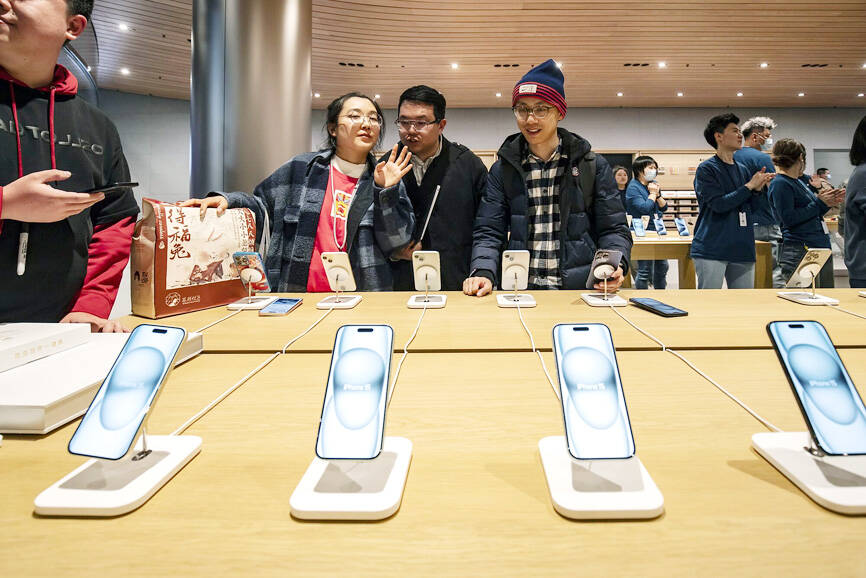Apple Inc’s iPhone shipments stabilized in the June quarter as the wider smartphone market accelerated its growth, independent research showed.
Global smartphone shipments rose 6.5 percent year-on-year, International Data Corp (IDC) said, while Counterpoint Research figures showed that sales to consumers increased 6 percent.
Aggressive discounts around China’s “618” shopping festival helped entice consumers in the world’s biggest mobile market, where Xiaomi Corp (小米) and a resurgent Huawei Technologies Co (華為) have been making inroads this year.

Photo: Bloomberg
The new research adds to data from Chinese authorities showing the iPhone staging a recovery since March.
Apple shipped 45.2 million handsets in the second quarter, a 1.5 percent improvement from the same period a year earlier, IDC said.
Counterpoint’s figures, which address end-user sales, showed a 1 percent decline, and both research groups found the iPhone giving up market share.
Xiaomi was the biggest riser, largely powered by entry-level handsets and emerging markets.
The iPhone has been under pressure in China from local players as well as a government ban on foreign devices at state-run workplaces.
Discounts and the promise of new artificial intelligence (AI) enhancements has helped steady sales for Apple and market leader Samsung Electronics Co, which is also promoting a new generation of phones with AI additions.
“Apple’s momentum in Q2 improved significantly from the negative growth they saw in first quarter,” IDC research director Nabila Popal said. “This is in part due to heavy discounts and promotions in many regions, but also thanks to renewed customer confidence after WWDC [Worldwide Developers Conference] when Apple finally announced its AI strategy.”

‘SWASTICAR’: Tesla CEO Elon Musk’s close association with Donald Trump has prompted opponents to brand him a ‘Nazi’ and resulted in a dramatic drop in sales Demonstrators descended on Tesla Inc dealerships across the US, and in Europe and Canada on Saturday to protest company chief Elon Musk, who has amassed extraordinary power as a top adviser to US President Donald Trump. Waving signs with messages such as “Musk is stealing our money” and “Reclaim our country,” the protests largely took place peacefully following fiery episodes of vandalism on Tesla vehicles, dealerships and other facilities in recent weeks that US officials have denounced as terrorism. Hundreds rallied on Saturday outside the Tesla dealership in Manhattan. Some blasted Musk, the world’s richest man, while others demanded the shuttering of his

TIGHT-LIPPED: UMC said it had no merger plans at the moment, after Nikkei Asia reported that the firm and GlobalFoundries were considering restarting merger talks United Microelectronics Corp (UMC, 聯電), the world’s No. 4 contract chipmaker, yesterday launched a new US$5 billion 12-inch chip factory in Singapore as part of its latest effort to diversify its manufacturing footprint amid growing geopolitical risks. The new factory, adjacent to UMC’s existing Singapore fab in the Pasir Res Wafer Fab Park, is scheduled to enter volume production next year, utilizing mature 22-nanometer and 28-nanometer process technologies, UMC said in a statement. The company plans to invest US$5 billion during the first phase of the new fab, which would have an installed capacity of 30,000 12-inch wafers per month, it said. The

Taiwan’s official purchasing managers’ index (PMI) last month rose 0.2 percentage points to 54.2, in a second consecutive month of expansion, thanks to front-loading demand intended to avoid potential US tariff hikes, the Chung-Hua Institution for Economic Research (CIER, 中華經濟研究院) said yesterday. While short-term demand appeared robust, uncertainties rose due to US President Donald Trump’s unpredictable trade policy, CIER president Lien Hsien-ming (連賢明) told a news conference in Taipei. Taiwan’s economy this year would be characterized by high-level fluctuations and the volatility would be wilder than most expect, Lien said Demand for electronics, particularly semiconductors, continues to benefit from US technology giants’ effort

Minister of Finance Chuang Tsui-yun (莊翠雲) yesterday told lawmakers that she “would not speculate,” but a “response plan” has been prepared in case Taiwan is targeted by US President Donald Trump’s reciprocal tariffs, which are to be announced on Wednesday next week. The Trump administration, including US Secretary of the Treasury Scott Bessent, has said that much of the proposed reciprocal tariffs would focus on the 15 countries that have the highest trade surpluses with the US. Bessent has referred to those countries as the “dirty 15,” but has not named them. Last year, Taiwan’s US$73.9 billion trade surplus with the US